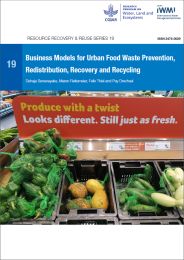Resource Recovery & Reuse – 19
Citation:
Senanayake, D.; Reitemeier, M.; Thiel, F.; Drechsel, P. 2021. Business models for urban food waste prevention, redistribution, recovery and recycling. Colombo, Sri Lanka: International Water Management Institute (IWMI). CGIAR Research Program on Water, Land and Ecosystems (WLE). 85p. (Resource Recovery and Reuse Series 19). doi: [https://doi.org/10.5337/2021.208]
Abstract
A necessary extension of the concept of Resource Recovery and Reuse with an even higher priority is the prevention and reduction of waste. One concern, in particular, is food waste, which constitutes the largest share of human waste. Target 12.3 of the United Nations Sustainable Development Goals (SDGs) is to ‘halve per capita global food waste at the retail and consumer levels and reduce food losses along production and supply chains, including post-harvest losses, by 2030’. For this report, over 400 businesses were analyzed to identify common approaches and business models to address the food waste challenge. The business models are presented under seven categories – measurement, redistribution, resell, value addition, responsible waste collection, resource recovery, and recycling – with a special focus on their application potential to the Global South.
ISSN 2478-0510 (Print)
ISSN 2478-0529 (Online)
ISBN 978-92-9090-915-6


